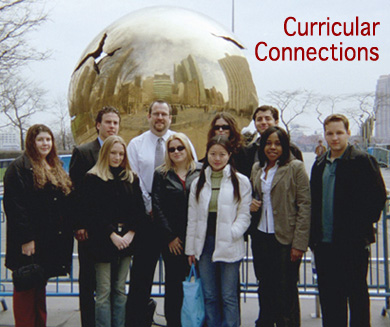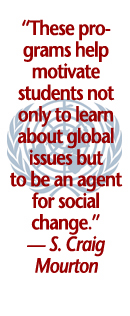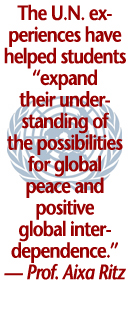
Metropolitan
Campus Director of
Student Life
S. Craig Mourton,
second from left in
back, regularly
coordinates U.N.
trips and briefing
sessions for student
scholars. Enoying a
recent trip are, front
row from left, Laura
Righter, Dorata
Dolata, Jennifer
Hendershot, You Hui
Li, Janel Keeys
and Carlos Farelo;
back row from left,
Charles Lemay,
Mourton, Kathleen
Horton and Jorge
Montero. In the
background is
Arnaldo Pomodoro’s
sculpture “Sphere
Within a Sphere.”

As one of the few universities in the country to have nongovernmental organization (NGO) status with the United Nations, Fairleigh Dickinson faculty and students enjoy special access to U.N. resources and facilities. More and more student scholars on both New Jersey campuses are taking advantage of these privileges as lessons from and about the United Nations are being woven throughout the curriculum.
S. Craig Mourton, director of student life on the Metropolitan Campus, helps coordinate the U.N. trips for the Global Scholars (students who live, study and socialize together while exploring global issues) and the Leaders Scholars (those who hold Student Government Association offices and other select campus leaders). Both of these programs emphasize the United Nations. Mourton helps select a topic for study, such as global energy issues, world hunger or women’s rights, and Dalila Suhonjic, director of global initiatives, arranges for the United Nations to select a diplomat and schedule a private briefing.

“The students enjoy the opportunity to make connections between what they are studying and what’s happening in the world,” says Mourton.
Students also take private tours of the United Nations. “The tour gives great insight into the United Nations,” says Mourton. “It’s important for our students to develop an awareness of global issues and in-depth knowledge of this major international organization. These programs help motivate students not only to learn about global issues but to be an agent for social change.”
Naomi Weinberger, associate professor of political science at the College at Florham, teaches courses on international relations and directs the Florham Scholars program, in which, like the Global Scholars, students live in a specially reserved residence hall and participate in academic and extracurricular programs with an international dimension. The Florham Scholars have attended the U.N. lectures and videoconferences and visited the Manhattan headquarters.
Weinberger, who previously was the director of the U.N. Studies Program at Columbia University, New York City, particularly emphasizes the United Nations in her teachings. Her course International Organizations especially focuses on the United Nations.
She believes, “American college students need to gain a better understanding of how the rest of the world views the United States.” That understanding can be gained, she says, by studying the United Nations and other international organizations. She adds that the students have been “enthusiastic and eager to learn about the United Nations.”
Other courses and academic programs also are taking advantage of the access to the United Nations. Michael Sperling, associate provost for interdisciplinary, distributed and global learning, says, “We’re getting more commitment from faculty bringing students to lectures and integrating the lectures and/or trips to the United Nations into their classes.”

Aixa Ritz, a clinical assistant professor of hotel, restaurant and tourism management at the Metropolitan Campus, says her students have benefited greatly from visits to the United Nations. “Being in the General Assembly and the Security Council rooms is thrilling for them, and it gives them a new perspective on what the United Nations, as a global organization, is and can be.” She adds that through such experiences, students have “expanded their understanding of the possibilities for global peace and positive global interdependence.”
One special degree program in which the United Nations plays a significant role is the bachelor of arts in interdisciplinary studies. The program, introduced in 2002, requires the seminar International Organizations in the 21st Century, which focuses on the United Nations. Teaching that course is none other than Ahmad Kamal, former ambassador from Pakistan. “He brings to the classroom incredible real-world experiences, and he is committed to making people aware that they are part of a world that is very interconnected,” says Richard Castellana, professor of humanities and fine arts on the Metropolitan Campus, who directs the program. “He also conveys a sense of mission to students that we have a responsibility to become aware of what’s happening in our world as well as a sense of responsibility to make the world a better place.”
Kamal also teaches Globalization and the State, and Concepts and Practice of Leadership I and II. He says, “The experience of teaching at Fairleigh Dickinson has enabled me to view the global vision of the University from even closer quarters. It has been an enriching experience for me, and hopefully for the students.”
Return to Opening Page
Renewing Old Bonds | An Illustrious Lineup
Curricular Connections | In the Front Lines
Students Seize the Initiative | A Long Line of Links
FDU Magazine Home | Table of Contents | FDU Home | Alumni Home | Comments
©Copyright 2004 Fairleigh Dickinson University. All rights reserved.
For a print copy of FDU Magazine, featuring this and other stories, contact Rebecca Maxon, editor,
at 201-692-7024 or maxon@fdu.edu.